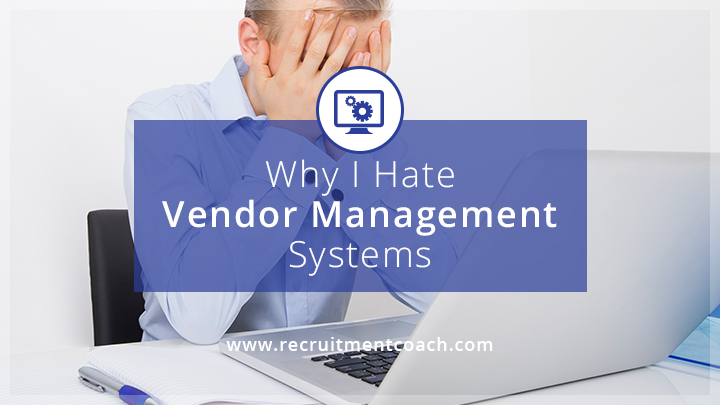I hate Vendor Management Systems because they take the fun out of recruiting, turn us into administrators, create some major frustrations and ultimately make it harder to earn our placement fee.
I wrote an article on this subject for Recruiter Magazine a few years ago: Recruiting via ‘Portals’ is a Waste of Time. Since then, the problem has only become worse.
Wikipedia says a Vendor Management System (VMS) is:
“A web-based software application that acts as a mechanism for business to manage and procure staffing services – a tool that distributes job requirements to staffing companies, recruiters, consulting companies and other vendors. It facilitates the interview and hire process, as well as labour time collection, approval and payment.”
In theory a VMS is supposed to deliver reduced time-to-hire, vendor performance metrics, streamlined work-flows, optimisation of supplier base and cost reduction.
What Wiki omits is that the VMS might actually inhibit the attraction of top talent at the mid to senior level. In which case the user could be sacrificing on quality of staff hired in exchange for short-term cost reduction and risking the future competitiveness of their company.
Also not included is the effect the VMS has on recruiters. In the words of Tom Hadley, Director of Policy, Recruitment & Employment Confederation,
“I can completely understand that there might be recruiters who would like to see it disappear overnight.”
That’s how I feel too.
But VMS’s have proliferated widely, some parties must be benefiting.
Chiefly it is employers needing a large number of temporary workers, for example in the public sector. Managing large-scale recruiting in-house is a huge task, so a new approach to simplify the process and save money looks attractive
For this to work you have to see workers as a commodity. That word means there is no significant difference in an item regardless of source – the electricity coming out of your wall socket is all the same stuff, whoever sends you a bill – the only thing that matters is the price.
It’s tempting for companies to try using Vendor Management Systems for roles requiring a greater skill level – digital marketing specialists, interim managers, sales reps, scientists, engineers. But here it can result in unsatisfactory hires and frustration for all involved, especially in occupations with skills shortages.
The problem arises if clients think that with VMS technology there is no need for recruiters to talk to the end user and they prohibit or discourage recruiters from developing relationships with individual managers.
There are reasons to have some control over the level of contact, but what mustn’t get lost is the in-person discussion between a skilled recruiter and client about precisely what the job entails.
Recruiters need to understand the profile of the sort of person the client is looking for, the background, qualifications, experience, what’s involved in their hiring process.
And you won’t be able to attract top talent unless you know the role’s selling points and the long-term career prospects.
[pullquote align=”right”]The problem arises if clients think that with VMS technology there is no need for recruiters to talk to the end user and they prohibit or discourage recruiters from developing relationships with individual managers. [/pullquote]
In-person briefing by the client is optimum because people convey what they mean more easily with speech than in writing, and we recruiters can ask questions if something isn’t clear.
Once you have the information you can work out a strategy and begin recruiting, short listing and presenting recommended candidates to the client. If you have understood the brief correctly, and do a careful job, these people should match the client’s requirements closely.
In the absence of a properly investigated brief, an automated process is more likely to employ generalised job descriptions, stuffed with jargon. How would you identify candidates with appropriate qualities from this real ad?
“As (Company)’s place-making director one of your key roles will be to develop productive relationships with stakeholders, developing a common sense of purpose based around a shared understanding of (Company)’s sense of place in order to improve (Company)’s economic competitiveness.”
Boilerplate job descriptions, invite boilerplate job applications – this is low grade stuff, Garbage in: Garbage out, leading to poor hires, wasted time, money and opportunities.
It’s supposed not to happen, but in practice, VMS’s cause other undesirable side effects – a major complaint from recruiters is that they get feedback late or never. Because of reduced communication between the recruiter and the client, you’ll probably have to submit more candidates before you get a placement, effectively there’s less return for your time and effort.
So why are recruitment agencies uploading resumes to VMS’s in ever-increasing numbers?
Because they suck at business development!
And they make the feeble rationalisation that “Something is better than nothing – once in a while we make a placement.”
Come on, you aren’t a spray and pray merchant. Don’t you provide added value to your client? Aren’t you the deal architect, an expert at anticipating and preventing deal-breakers, a skilled negotiator who’s integral to the hiring process? Don’t you help define the job brief? Aren’t you the professional matchmaker who hunts down “A” players and persuades them to interview with your client?
Recruiters: fire the clients who won’t talk to you, who don’t give feedback, who move at snail’s pace, who pay low fees. Free up your time then get busy on the phone and find a better job order with a higher quality client.



